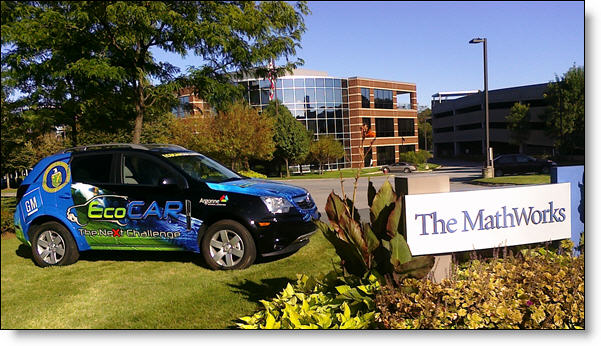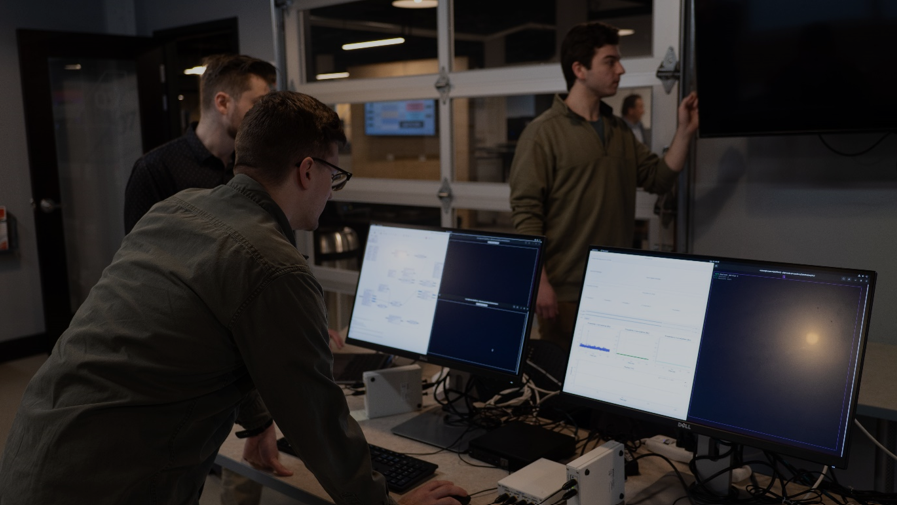Where Are They Now? – Jessica Britt, Argonne National Laboratory
Today we are talking to Jessica Britt from Argonne National Labs. As a student at the Georgia Institute of Technology between 2014 and 2018, Jessica participated in EcoCAR 3.

What Did You Learn in EcoCAR?
Why did you choose to get involved in the competition?
My friend found out about the EcoCAR program, and she wanted someone to join with her. At this point, my only experience with cars was watching the Barret-Jackson auto auction with my father. I figured that EcoCAR would be a great opportunity to gain real world experience, and possibility help me with an internship. After joining the team, I fell in love with EcoCAR.
What was your role on the team?
Over my four years on the team, I held a variety of different technical and non-technical roles. My primary role was the Modeling, Simulation, and Controls Team Lead.
- Budget Manager: Balance financial accounts, record expenses, and track budgets for subteams.
- Project Management Team Lead: Organize team to prevent scope creep, create schedules, keep track of budgets, and communicate with all subteams. Secure corporate sponsorships. Recruit new team members.
- Communications Team Member: Plan events for sponsors, influencers, alumni, and target audiences. Arrange meetings with government influencers.
- Electrical Team Member: Develop plan for low voltage wiring. Document, map, and solder engine wiring harness. Add new control modules to body wiring harness. Perform connectivity tests.
- Modeling, Simulation, and Controls Team Lead: Organize team to develop Simulink vehicle models, Stateflow controls code, comprehensive test plans, models for dSPACE testing, and AutomationDesk projects. Train team members in software, hardware, and systems safety protocol. Present to sponsors on engineering design process execution.

Did you use MATLAB/Simulink in the development of your car?
All of our vehicle performance and fuel economy simulations were performed in Simulink.
We programmed our controller using Simulink and Stateflow. When the controller code was complete, we could easily build it into C code for the ETAS 910 controller.
We also wrote MATLAB scripts to help us process and analyze all vehicle CAN data we collected.
How Did EcoCAR Help You Find a Job?
They were confident that I had the knowledge to excel in the position because the tasks I completed in EcoCAR were almost the same tasks that full-time controls engineers do.
Did your hands-on experience in the competition help to prepare you for your first role in industry?
Joining EcoCAR was the best decision I made in college, and it has completely defined my career. Without EcoCAR, I would not have found my passion in control systems, pursued a Master’s degree in control systems, or taken my current role at Argonne National Laboratory.
EcoCAR is unique because it provides students with the chance to learn both technical and non-technical skills in an environment that operates similarly to a start-up. You have to design a product for a real customer, and there are constraints with your budget, time, human resources, etc. You have to plan for your activities, and you need to collaborate with your whole team. As an EcoCAR student, I worked with mechanical engineers, electrical engineers, chemical engineers, computer scientists, business majors, and communications specialists on a daily basis. All of these people think in different ways, and EcoCAR allowed me to learn how to collaborate and communicate with people outside my background. EcoCAR gave me the opportunity to improve my leadership skills. In my current role as an organizer for the EcoCAR Mobility Challenge, my student experiences are invaluable.
EcoCAR also provided me the opportunity to gain invaluable technical skills. As a student, I learned how to use hardware and software from companies like MathWorks, dSPACE, ETAS, and Vector; these are the exact same tools that companies use in industry! As a student, when I would go to a job interview, my potential supervisors were blown away by my experiences in EcoCAR. They were confident that I had the knowledge to excel in the position because the tasks I completed in EcoCAR were almost the same tasks that full-time controls engineers do.

What Are You Working On Today?
All of our teams are using MathWorks products for the development of their vehicle models and controller software.
What big project are you working on right now?
I am an organizer for the EcoCAR Mobility Challenge. The EcoCAR Mobility Challenge is a four year competition with 12 universities in North America who are turning 2019 Chevrolet Blazers into hybrid-electric, semi-autonomous vehicles for a mobility-as-a-service market. I am responsible for areas of the competition related to controls, modeling, functional safety, and user experience. I work directly with students to help them set and achieve goals. I also work with our Industry sponsors, such as MathWorks, to identify what skills students need to accomplish their goals and to develop training materials that help students succeed. All of our teams are using MathWorks products for the development of their vehicle models and controller software.
Key Takeaways
Hands-on projects are a great way to apply what you learn in the classroom, refine your technical skills, tackle real world problems, and discover what areas of engineering you are passionate about.
What advice would you give young engineers seeking employment post-grad?
Get involved in an experiential learning project! Hands-on projects are a great way to apply what you learn in the classroom, refine your technical skills, tackle real world problems, and discover what areas of engineering you are passionate about. They can be a lot of fun and are a great way to make lifelong friends! Joining EcoCAR was without a doubt the best decision I made in college.

- Category:
- Automotive,
- Where-Are-They-Now









Comments
To leave a comment, please click here to sign in to your MathWorks Account or create a new one.